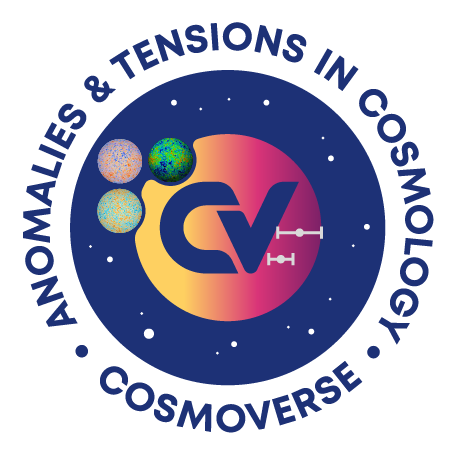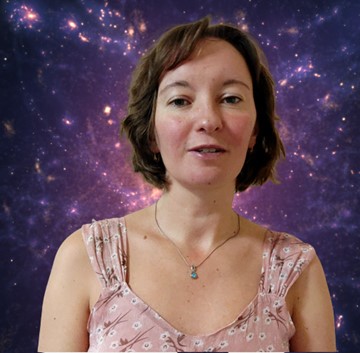What is your name, affiliation, academic position, and job title?
My name is Denitsa Staicova, I’m an assistant professor at the Institute for Nuclear Research and Nuclear Energy, Bulgarian Academy of Sciences. I’m also the Officer for gender balance and diversity, ITC, and YRI for the CosmoVerse COST Action.
What is your journey?
I obtained my PhD at the Sofia University “St. Kliment Ohridski”, Bulgaria where I worked on quasinormal modes of black holes and modelling astrophysical jets. My work in cosmology started thanks to a grant connecting young scientists with mentors, and it was dedicated to the cosmological solutions from the multi-measure model. The grant was very successful and it sparked my interest in cosmology and data analysis on which I’ve been working since.
What is your field of research and/or what project are you involved in?
I have been part of some very exciting projects related to testing cosmological models – within the limits of GR or beyond it – with the methods of machine learning. In them, we analyse data from different astrophysical sources – baryonic acoustic oscillations, supernovae, cosmic chronometers, cosmic microwave background and gamma-ray bursts – and try to find which models describe the data best and what they imply for the future of the universe.
What are your research plans?
Right now, I am investigating how one can use gamma-ray burst time delay datasets in cosmology. The time delay datasets are interesting because they try to identify specific features in the GRB lightcurve as received on Earth and to connect them with the predicted by some theories of quantum gravity energy-dependent time-delay. This effect is very small, and there are many unknowns related to it, but the development of methods to measure it will allow cosmologists to use the time-delay datasets to test cosmological models in a new way, not directly dependent on luminosity measurements.
How does CosmoVerse fit within those plans?
CosmoVerse funded my STSM to the Complutense University in Madrid, Spain, where I presented my results on the GRB time-delay problem and discussed new perspectives with colleagues. I also hosted an STSM allowing me to join a project dedicated to using binary systems to constrain the cosmological constant. In general, CosmoVerse is a great tool for facilitating collaborations with colleagues from different parts of Europe.
What are the most exciting open questions in your research area?
The nature of the cosmological tensions is no doubt one of the most important questions. The Hubble tension and the degeneracy between different parameters such as the sound horizon and the matter density require not only better observational data and better understanding of the systematic errors but also new numerical methods to extract the information from the data we have and new theories looking into the possible physical origin of the tension. Solving the tension is in essence an interdisciplinary effort that may lead to a new concordance cosmological theory telling us a new story for the past and the future of the Universe. The age of the Universe is another very exciting topic in the field, especially now with new data arriving from the JWST, Euclid and other flagman space telescopes.
What advances or new results are you excited about or looking forward to?
I’m looking forward to the new data we’ve been receiving from JWST and Euclid. These marvelous pieces of technology can literally revolutionise our understanding of the Universe, especially combined with the data from LIGO, IceCube and eventually LISA. The so-called multi-messenger approach that includes observations of all known to us carriers of information – photons, gravitational waves, and neutrinos would allow for the fullest possible picture of our reality.
What is your view on cosmic tensions? How does your work connect with this open question in the community?
The cosmic tensions are a catalyst for improving our observational methods and our data analysis and they have already produced a lot of progress in this respect. They have also encouraged the most stringent possible testing of numerous theories of extended and modified gravity even though for now without much success in simultaneously reconciling the observed tensions. For me, having a serious challenge is an opportunity to learn new things. My work is a little piece of the puzzle we are all hoping to solve.
What role do you think a community network like CosmoVerse can play in developing theoretical astroparticle physics and cosmology?
The CosmoVerse COST Action can be essential in fostering collaboration between ITC and COST Member countries, and in helping young scientists to travel and to connect to some of the leading specialists in the field. Through the weekly seminars, it stimulates discussions challenging our understanding and leading to new approaches to the problem. The Diversity policy CosmoVerse endorses advocates for equality and mutual respect, actively fostering a vibrant and inclusive community.
What do you like and dislike about being a scientist?
Being a scientist is a very specific state of the mind in which you have to constantly challenge what you already know in order to explore new possibilities and to convert them into new knowledge. I really appreciate the freedom to work on what I find exciting and the opportunity to work with many people on different projects. The main disadvantage is the salary, which is particularly low in Eastern Europe. This also extends to not having enough funds for work travels, which are so important in science. Covid, in a way, allowed people from ITC countries to participate in more projects through online meetings, but live contact is still very important for our work.
Your favourite scientist and/or science fiction film?
My favourite scientist is Emmy Noether because of her great contribution to physics at a very difficult time for women in science. My favourite sci-fi movie is Interstellar because of the great detail into which the producers and the writers went to make the story scientifically correct. Being a work of fiction, one cannot expect extreme correctness, but the effort they made is impressive and the story is very engaging and touching. My favourite sci-fi books are “SevenEves” by Neal Stephenson and “The Manifold Trilogy” by Stephen Baxter. Also Peter Hamilton’s space operas which are absolutely mind blowing. And “Spin” by Robert Charles Wilson (with my favourite quote: “We’re as ephemeral as raindrops. We all fall, and we all land somewhere.”).
What do you hope to see accomplished scientifically in the next 50 years?
Fifty years is a rather long time, so science-wise, it’s hard for me to predict what we’ll have learned by then, especially with the current LLM boom. But I hope that humankind will eradicate disease and master DNA repairs, through AI research and personalised medicine. I believe that humans need to become interplanetary species so being able to repair our bodies and extend our lives seems crucial step, along with new materials and eventually propulsion. And hopefully, we will have learned how to live on our beautiful Planet without destroying it ourselves, because colonising new planets won’t make a lot of sense if we don’t take better care of them.

